You wake up, look in the mirror, and see radiant, clear skin staring back at you. While skincare products line bathroom shelves worldwide, the secret to healthy skin might actually be sitting in your kitchen. The age-old saying "you are what you eat" holds remarkable truth when it comes to skin health, with cutting-edge research in 2025 revealing that nutrition plays a far more powerful role in preventing skin problems than previously understood.
• Nutrition directly impacts skin health through the bloodstream, affecting skin cell structure, function, and appearance within 4-6 weeks of dietary changes
• Antioxidant-rich foods and omega-3 fatty acids provide essential protection against premature aging and maintain skin barrier function
• High-glycemic foods and processed meals accelerate skin aging and trigger inflammatory responses that lead to breakouts
• Personalized nutrition approaches based on genetic factors offer the most effective strategies for preventing skin problems
• A balanced whole-food diet remains superior to supplements alone for achieving optimal skin health outcomes
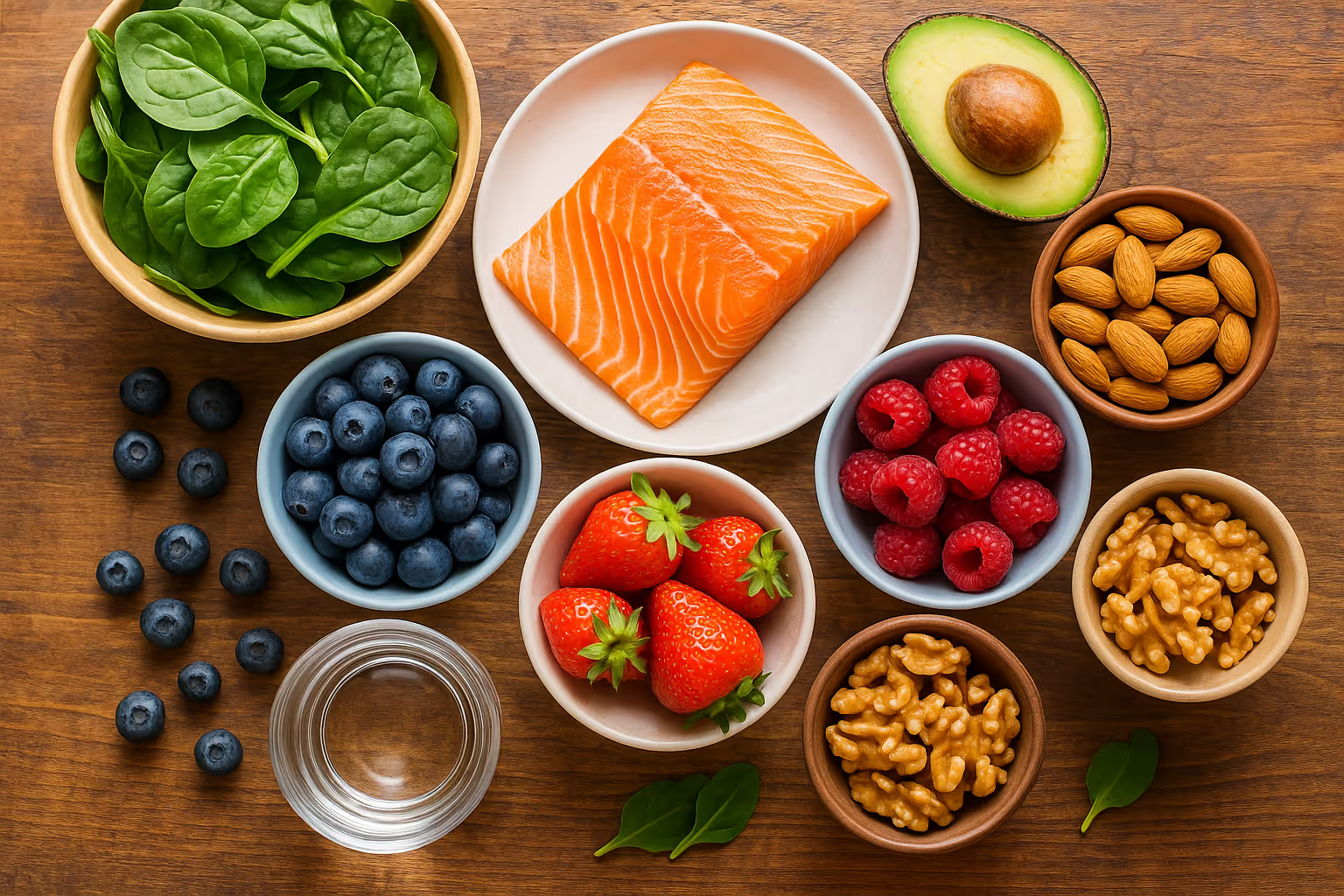
The relationship between what we consume and our skin's appearance represents one of the most fascinating areas of modern dermatological research. Diet and skin health share a bidirectional connection that goes far beyond surface-level effects. When nutrients travel through the bloodstream, they directly reach skin cells, influencing their structure, function, and overall appearance [1].
Recent scientific breakthroughs have revealed that nutrition can prevent skin problems by addressing the root causes of skin aging and inflammation. The skin undergoes a natural renewal cycle every 28 days, requiring adequate nutritional support for this continuous regeneration process [2]. This means that dietary choices made today will literally become visible on the skin's surface within a month.
At the cellular level, diet significantly influences the production and activation of reactive oxygen species (ROS), which represents the main factor associated with extrinsic skin aging [1]. When the body produces excessive ROS due to poor dietary choices, it accelerates the breakdown of collagen and elastin—the proteins responsible for skin's firmness and elasticity.
Conversely, a nutrient-dense diet provides the building blocks necessary for optimal skin function. Professional dermatological care often emphasizes this nutritional foundation as a cornerstone of comprehensive skin health management.
Understanding which nutrients support skin health empowers individuals to make informed dietary choices. The following nutrients have demonstrated significant benefits for preventing and addressing various skin concerns.
Antioxidants serve as the skin's primary defense against environmental damage and premature aging. These powerful compounds neutralize free radicals before they can damage skin cells.
Key Antioxidants for Skin Health:
Research shows that vitamin C can directly promote collagen gene expression while eliminating intracellular reactive oxygen species, effectively preventing lipid peroxidation and delaying skin aging [3]. This water-soluble vitamin works synergistically with other antioxidants to provide comprehensive protection.
Omega-3 fatty acids maintain skin moisture, firmness, and flexibility while supporting the skin's protective lipid barrier [2]. Studies demonstrate that these healthy fats show an inverse correlation with severe photoaging, meaning higher consumption leads to younger-looking skin [1].
Best Sources of Skin-Supporting Fats:
Several minerals work as cofactors in enzymatic reactions that protect and repair skin tissue. Zinc, selenium, and copper lower intracellular oxidative stress and regulate skin protection mechanisms [1].
MineralSkin BenefitFood SourcesZincWound healing, acne preventionOysters, pumpkin seeds, chickpeasSeleniumUV protection, elasticityBrazil nuts, tuna, mushroomsCopperCollagen productionDark chocolate, cashews, lentils
Creating a skin-supporting diet involves emphasizing foods that provide essential nutrients while minimizing those that trigger inflammation or oxidative stress.
Antioxidant-Rich Fruits and Vegetables
Healthy Protein Sources
Hydrating Foods
The Mediterranean dietary pattern has gained particular attention for its anti-inflammatory benefits and comprehensive approach to skin health [1]. This eating style emphasizes:
Research consistently shows that individuals following Mediterranean-style eating patterns experience less skin aging and fewer inflammatory skin conditions.
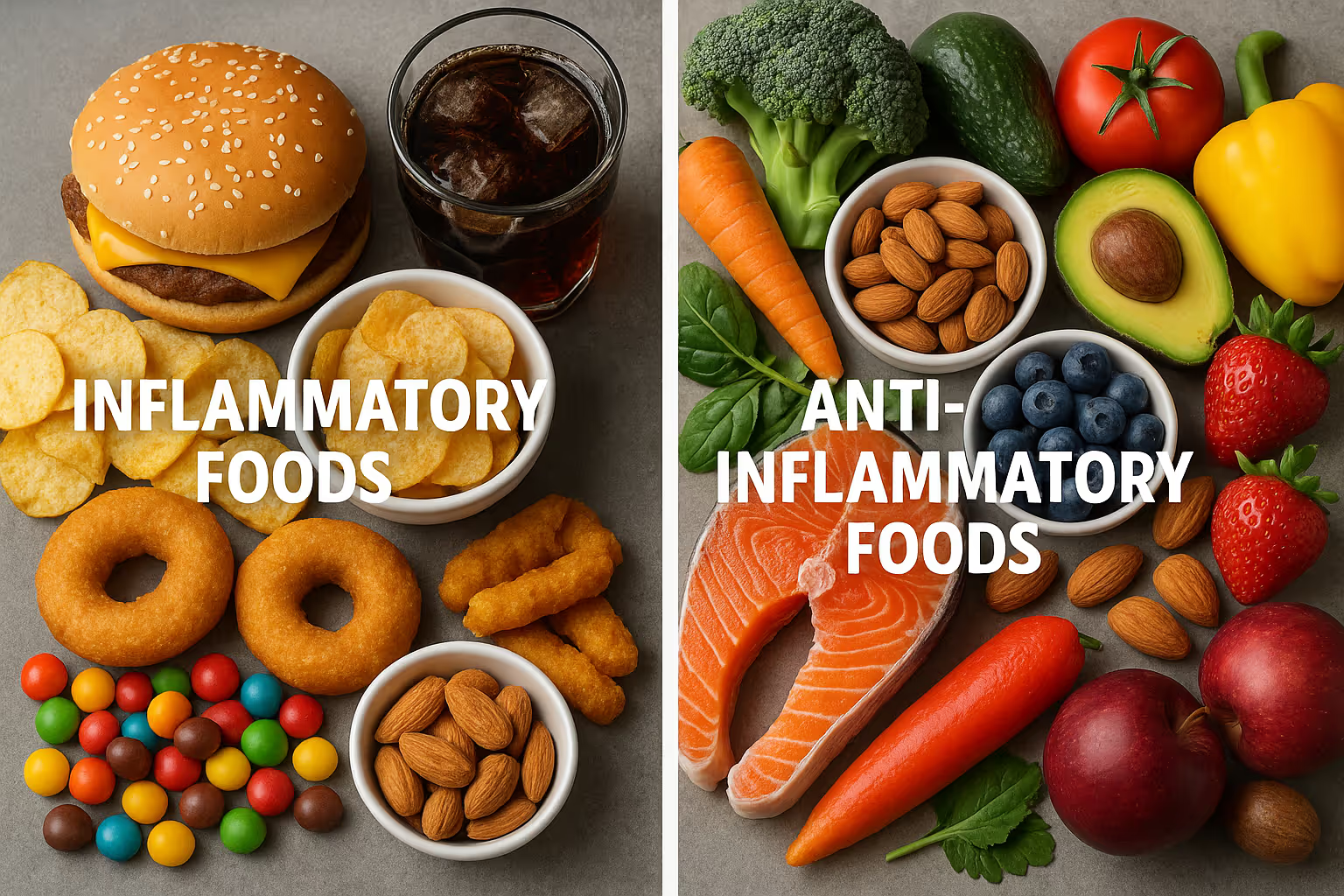
Just as certain foods promote skin health, others can accelerate aging and trigger skin problems. Understanding these dietary culprits helps individuals make better choices for their skin.
High-Glycemic Foods Foods that rapidly spike blood sugar levels trigger a cascade of inflammatory responses that manifest in the skin. High-glycemic foods stimulate oil-producing glands and promote the formation of advanced glycation end products (AGEs), which hinder collagen fiber reconstruction and accelerate aging [1].
Foods to Limit:
Trans Fats and Processed Foods Trans fats promote inflammation throughout the body, including the skin. These artificial fats interfere with the skin's natural barrier function and accelerate the aging process.
Inflammatory Foods to Avoid:
While research on dairy and acne remains mixed, some individuals experience improvements in skin clarity when reducing dairy consumption. The hormones naturally present in milk may influence sebum production and inflammatory responses in sensitive individuals.
For those concerned about skin conditions related to diet, working with healthcare professionals can help identify personal triggers and develop appropriate dietary modifications.
The connection between diet and acne has evolved from anecdotal observations to evidence-based science. Modern research confirms that dietary choices significantly influence acne development and severity.
Studies demonstrate a striking relationship between high-glycemic-index foods and longer acne duration, while low-glycemic-load diets reduce total lesion counts in acne patients [2]. When blood sugar spikes rapidly, it triggers:
Foods that fight acne share common anti-inflammatory properties:
"The skin reflects internal health status. When we nourish the body with anti-inflammatory foods, the skin responds with improved clarity and reduced breakouts." - Leading Dermatological Research, 2025
Proper hydration serves as the foundation of healthy skin maintenance, helping flush toxins and keeping skin cells functioning optimally [2]. Water supports every aspect of skin health, from nutrient delivery to waste removal.
Daily Water Intake
Hydrating Foods
Signs of Adequate Hydration
Understanding the timeline for skin improvements helps set realistic expectations and maintain motivation for dietary changes.
Most individuals notice skin improvements within 4-6 weeks of implementing dietary changes [2]. This timeframe aligns with the skin's natural renewal cycle:
Week 1-2: Internal changes begin
Week 3-4: Visible improvements emerge
Week 5-6: Significant changes
Month 3+: Long-term benefits
Several factors influence how quickly dietary changes affect skin appearance:
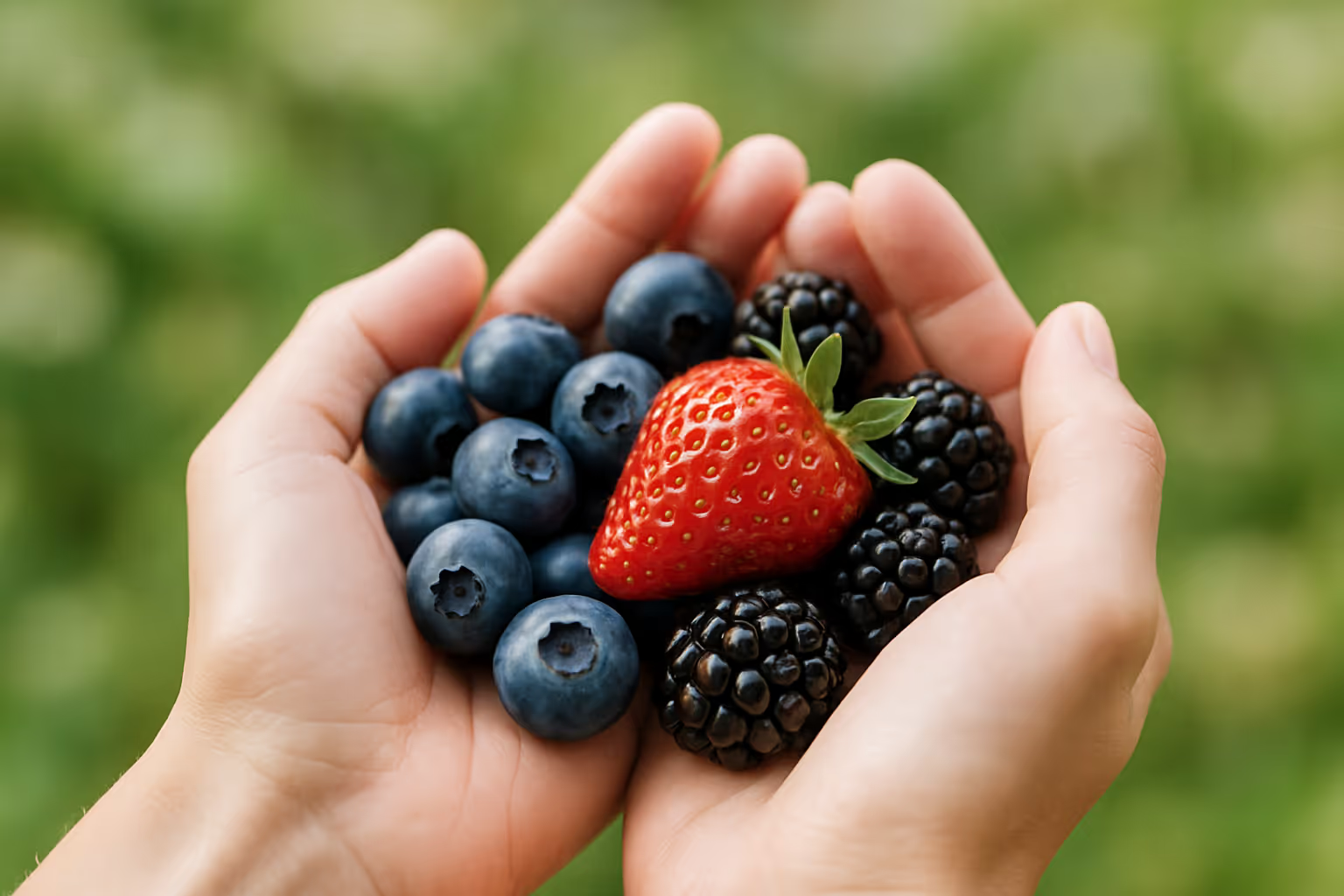
The future of nutrition and skin health lies in personalized approaches that consider individual genetic variations, lifestyle factors, and specific skin concerns.
Genetic polymorphism significantly affects skin health through various biological pathways [3]:
Modern approaches integrate multiple data sources to create personalized recommendations:
Assessment Components:
This comprehensive approach recognizes that genetic variations, such as those in the SLC23A1 gene (which affects vitamin C metabolism), influence nutritional needs and skin health outcomes [3].
For individuals seeking professional guidance, specialized medical teams can provide comprehensive assessments and personalized recommendations.
While the supplement industry offers numerous products targeting skin health, research consistently shows that whole foods provide superior benefits compared to isolated nutrients.
Synergistic Effects Whole foods contain hundreds of compounds that work together to enhance absorption and effectiveness. For example:
Bioavailability Benefits Natural food sources typically offer better bioavailability than synthetic supplements, meaning the body can more easily absorb and utilize the nutrients.
Targeted Supplementation can benefit individuals with:
Evidence-Based Supplements for Skin:
Emerging research reveals a powerful connection between gut health and skin appearance, often referred to as the gut-skin axis. This bidirectional communication pathway influences inflammation, immune function, and nutrient absorption.
How Gut Health Affects Skin:
Foods for Gut-Skin Health:
Research shows that probiotic supplementation may help with various skin conditions:
While nutrition forms the foundation of healthy skin, several lifestyle factors can enhance or diminish the benefits of a skin-supporting diet.
Quality sleep is essential for skin regeneration and repair processes. During sleep, the body:
Sleep Optimization for Skin Health:
Regular physical activity enhances the benefits of good nutrition by:
Skin-Friendly Exercise Tips:
Chronic stress can undermine even the best nutritional efforts by:
Stress-Reduction Strategies:
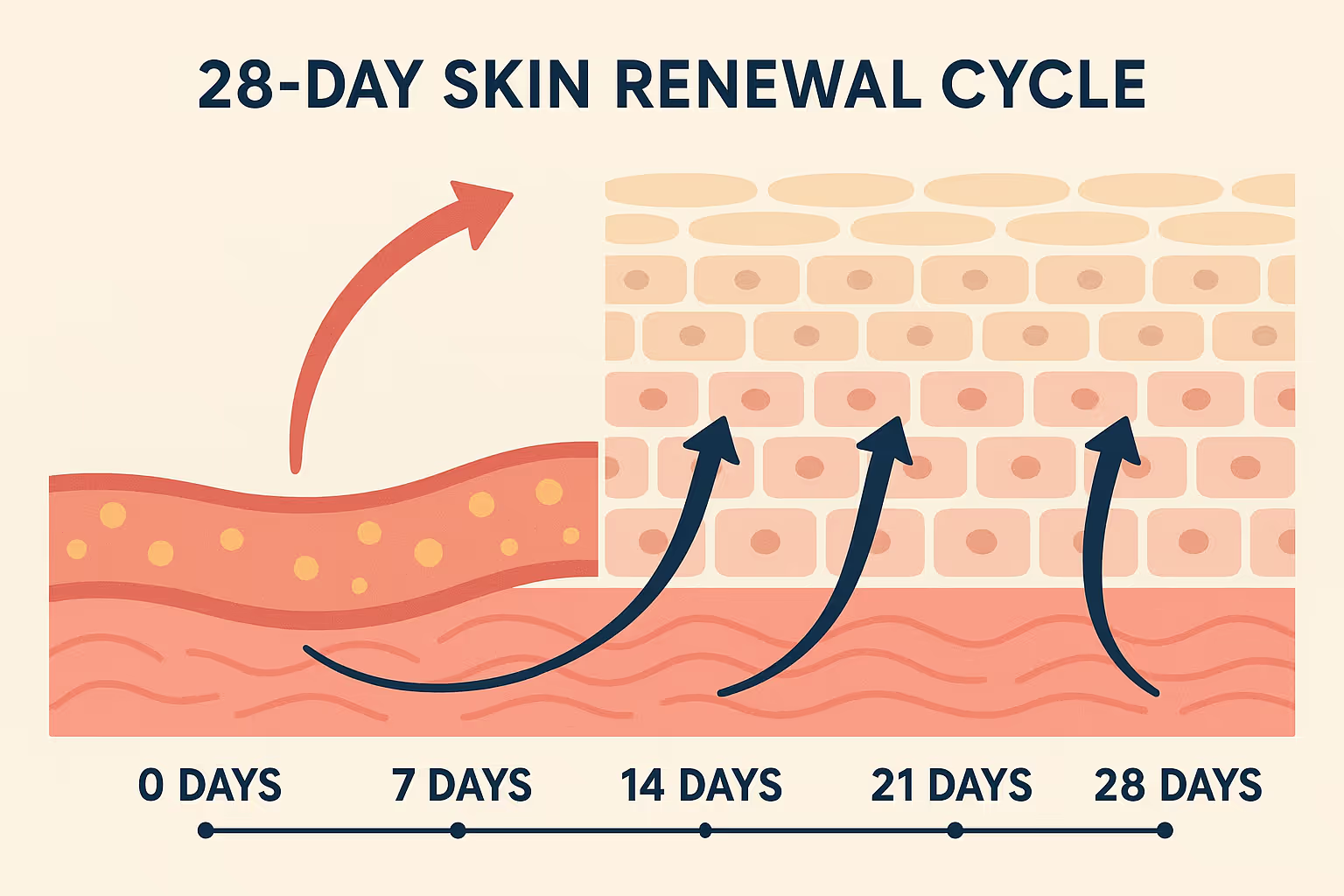
Different skin types and conditions may benefit from specific nutritional approaches, though the fundamental principles of anti-inflammatory, nutrient-dense eating remain consistent.
Focus Areas:
Helpful Foods:
Nutritional Priorities:
Beneficial Choices:
Anti-Aging Nutrition:
Key Foods:
For individuals with specific skin concerns or conditions, consulting with medical professionals can provide personalized guidance and treatment options.
Adjusting nutritional choices based on seasonal changes can optimize skin health throughout the year, addressing varying environmental challenges and nutritional availability.
Hot Weather Challenges:
Summer Nutrition Strategies:
Summer Skin Foods:
Cold Weather Challenges:
Winter Nutrition Focus:
Winter Skin Foods:
Separating fact from fiction helps individuals make informed decisions about nutrition and skin health.
Reality: High-quality dark chocolate (70%+ cacao) actually provides antioxidants that may benefit skin health. The issue isn't chocolate itself, but rather the high sugar content in milk chocolate and candy bars.
Reality: While adequate hydration is essential, excessive water intake doesn't necessarily improve skin appearance. The key is consistent, appropriate hydration combined with nutrients that support skin barrier function.
Reality: Common, affordable foods like carrots, spinach, eggs, and beans provide excellent skin-supporting nutrients. Variety and consistency matter more than exotic ingredients.
Reality: Individual genetic variations, health conditions, and lifestyle factors mean that optimal nutrition approaches vary between people. Personalization is key to success.
Reality: While supplements can fill specific gaps, whole foods provide synergistic compounds and better bioavailability that isolated nutrients cannot match.
Transitioning to a skin-supporting diet requires practical strategies that fit into real-world lifestyles and budgets.
Weekly Planning Steps:
Sample Daily Menu:
Breakfast:
Lunch:
Dinner:
Snacks:
Cost-Effective Strategies:
Affordable Skin Superfoods:
Restaurant Tips:
Fast-Casual Options:
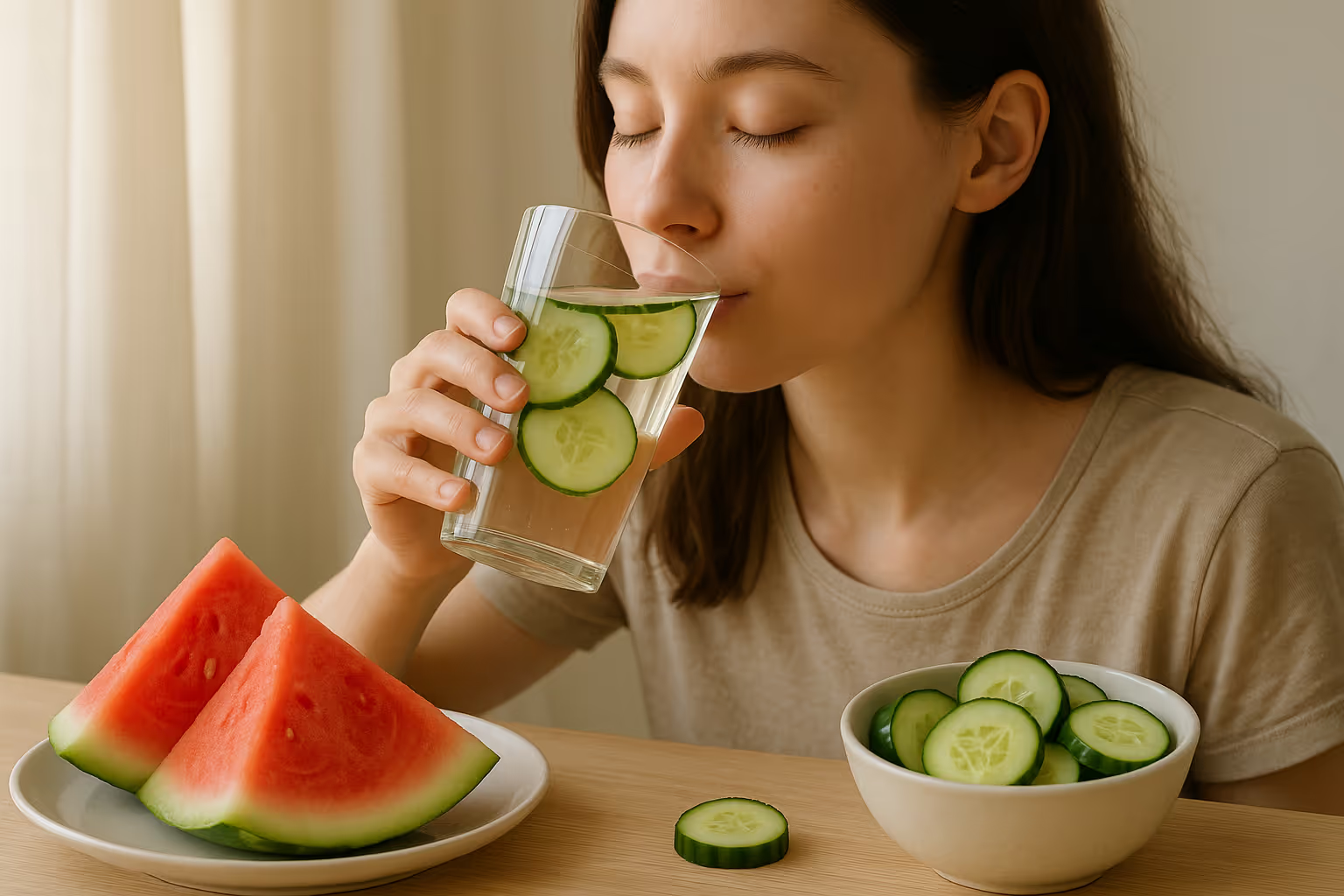
Tracking skin health improvements helps maintain motivation and identify what works best for individual needs.
Objective Measures:
Subjective Assessments:
Signs It's Working:
Signs to Modify Strategy:
For persistent skin concerns or questions about nutritional approaches, consulting with healthcare professionals can provide valuable guidance and medical expertise.
The field of nutritional dermatology continues evolving, with exciting developments on the horizon that may revolutionize how we approach skin health through diet.
Nutrigenomics Scientists are developing more sophisticated understanding of how genetic variations affect nutritional needs for skin health. This personalized approach may soon allow for precise dietary recommendations based on individual genetic profiles.
Microbiome Therapeutics Research into the gut-skin axis is revealing new connections between digestive health and skin appearance. Future treatments may include targeted probiotic strains specifically selected for skin benefits.
Bioactive Compounds Investigation of plant compounds beyond traditional vitamins and minerals is uncovering new skin-protective substances in foods like turmeric, green tea, and various berries.
Chronobiology Understanding how timing of nutrient intake affects skin health may lead to optimized eating schedules that maximize skin repair and regeneration.
The future likely holds more integrative approaches that combine:
This comprehensive approach recognizes that diet and skin health represent just one piece of the puzzle, albeit a crucial one.
The question "Can nutrition prevent skin problems?" has a resounding answer: absolutely. The scientific evidence clearly demonstrates that diet and skin health share an intricate, powerful connection that extends far beyond surface-level effects. Through the bloodstream, nutrients directly influence skin cell structure, function, and appearance, making dietary choices one of the most effective tools for preventing and addressing skin concerns.
The research reveals that a diet rich in antioxidants, omega-3 fatty acids, and anti-inflammatory foods can significantly slow skin aging, reduce acne severity, and promote overall skin health. Conversely, high-glycemic foods, trans fats, and processed meals accelerate aging and trigger inflammatory responses that manifest as various skin problems.
Key principles for skin-supporting nutrition include:
✅ Emphasize whole, nutrient-dense foods including colorful fruits and vegetables, lean proteins, and healthy fats
✅ Limit inflammatory foods such as refined sugars, processed snacks, and trans fats
✅ Stay consistently hydrated with water and water-rich foods
✅ Consider individual factors including genetics, existing health conditions, and personal sensitivities
✅ Be patient with results as skin improvements typically appear within 4-6 weeks of dietary changes
✅ Adopt a comprehensive approach that includes proper sleep, stress management, and appropriate skincare
The future of nutritional dermatology points toward increasingly personalized approaches that consider individual genetic variations, microbiome health, and lifestyle factors. This evolution promises even more effective strategies for using nutrition to prevent skin problems and maintain healthy, radiant skin throughout life.
Ready to harness the power of nutrition for healthier skin? Start with these actionable steps:
For comprehensive skin health support and professional medical guidance, explore the services and expertise available to help you achieve your skin health goals through both nutritional and medical approaches.
Remember, healthy skin is not just about looking good—it's about feeling confident and maintaining overall wellness. By understanding and applying the principles of diet and skin health, you're investing in both your appearance and your long-term health. The foods you choose today will literally become the skin you see tomorrow, making every nutritious meal a step toward the radiant, healthy skin you deserve.
[1] Cao, C., Xiao, Z., Wu, Y., & Ge, C. (2020). Diet and skin aging—from the perspective of food nutrition. Nutrients, 12(3), 870.
[2] Kucharska, A., Szmurło, A., & Sińska, B. (2016). Significance of diet in treated and untreated acne vulgaris. Postepy Dermatologii i Alergologii, 33(2), 81-86.
[3] Chen, J., Liu, Y., Zhao, Z., & Qiu, J. (2018). Oxidative stress in the skin: impact and related protection. International Journal of Cosmetic Science, 40(4), 380-390.
[4] Melnik, B. C. (2015). Linking diet to acne metabolomics, inflammation, and comedogenesis: an update. Clinical, Cosmetic and Investigational Dermatology, 8, 371-388.
[5] Schagen, S. K., Zampeli, V. A., Makrantonaki, E., & Zouboulia, C. C. (2012). Discovering the link between nutrition and skin aging. Dermato-Endocrinology, 4(3), 298-307.